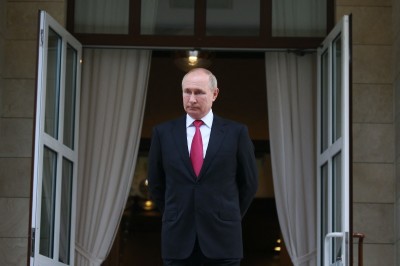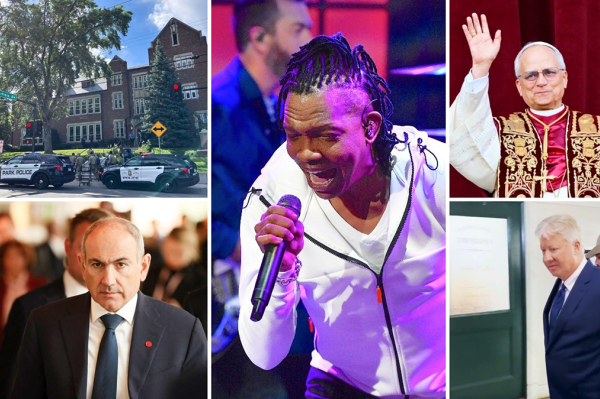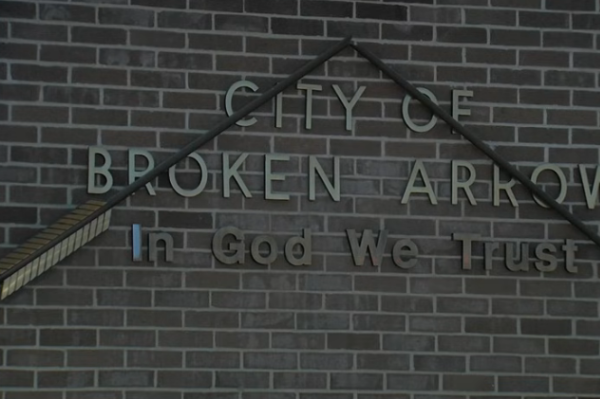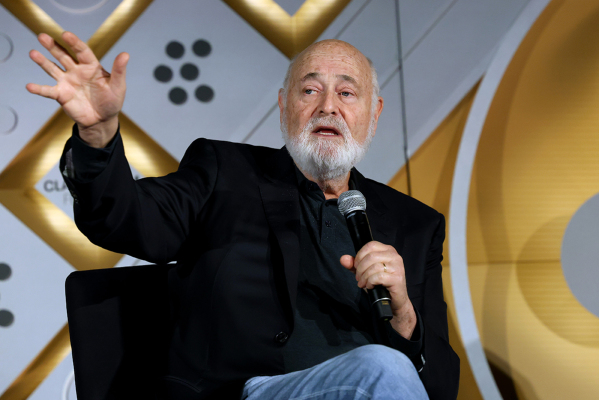How Christians enabled Putin

Most evangelical Christians denounce Putin’s actions in Ukraine. A Washington Post-ABC News poll taken February 20-24, 2022, as the Russians invaded Ukraine, “found that White evangelical Christians were just as negative toward Russia and supportive of sanctions as Americans overall."
"Among White evangelicals, 47% said Russia is an enemy of the United States and another 33% said it is unfriendly. Similarly, 68% supported sanctions and 51% said they would still support them if energy prices went up.”
Franklin Graham has said, “This is a war. I don’t support war and I don’t know of any Christian that supports war. We pray for peace, not war. We pray for peace, not war. I don’t support this at all.”
As evangelical Christians, together with the whole Western world, praise Ukrainian resistance against Russian invasion, it is prudent to recall the unfortunate praise previously lavished on Vladimir Putin’s authoritarian regime.
The Russian Orthodox church has taken on a foundational cultural role in Putin’s Russia by mustering pro-Putin sentiment and channeling absurd propaganda. Patriarch Krill has said (apparently with a straight face), “Listen carefully: Russia is now leader of the free world and can offer an example to other countries.”
Moreover, an Orthodox cathedral dedicated to the Russian military will feature mosaics of Putin and Stalin, among others. In a particularly deplorable showing of state loyalty, the Russian Orthodox church granted its tacit support to the infamous Yarovaya laws, meant to stamp out any and all proselytization. According to Paul Goble, writing for the Religious Freedom Institute, the Moscow Patriarchate’s leadership “clearly expected to benefit if the state punishes and closes down its religious competitors.”
Less well-known are overtures made, embraces offered, and long-standing connections developed between some American evangelicals and the Russian Orthodox church.
The chairman of the Russian Orthodox Church’s Department of External Relations, Metropolitan Hilarion, visited the U.S. and was welcomed into the pulpit in 2011 by Highland Park Presbyterian Church in Dallas, as well as visiting Dallas Theological Seminary and other evangelical leaders and institutions.
More concerning still was the relationship between the Russian Orthodox church and the World Congress of Families. This article treats the subject in further detail, but the important matters to note are that the WCF worked with the Russian Orthodox church on various events, had financial backing from Russian oligarchs, was welcomed by the Russian government, and sought to portray Russia as a leader of the pro-family movement. The WCF arranged for its 2014 conference to take place in Moscow, and then was forced to suspend those plans as the situation in Crimea unfolded.
As further proof that Putin was seeking to capture the attention of American Christians, Russian agent Mariina Butina sought to exploit the 2017 National Prayer Breakfast in order to build connections between attendees and various Russian officials and businessmen.
Sadly, some American Christians were eager to express positive views of Putin, allowing his public stance on homosexuality and gender issues to cover over his multitude of glaring faults.
“I can’t point to any country of the world today that is a model for the rest of the world, except perhaps for Russia, which has just taken the very important and frankly necessary step of criminalizing homosexual propaganda,” said a 2013 post by Abiding Truth Ministries Founder Scott Lively, an activist engaged in advocacy for traditional marriage.
Franklin Graham also spoke highly of Putin. In the leadup to the 2014 Olympic Games in Sochi, Russia, Graham called Russia’s standard on morality “higher than our own,” saying, “In my opinion, Putin is right on these issues. Obviously, he may be wrong about many things, but he has taken a stand to protect his nation’s children from the damaging effects of any gay and lesbian agenda.”
Graham later visited Russia and gave an interview on Russian television, more than a year after Russia’s annexation of the Crimean peninsula. In this interview, Graham stated, “Democracy is not for all people. In some parts of the world, it just doesn’t work.” He also lauded Putin’s protection of Bashar al-Assad’s regime in Syria. Finally, when asked about international sanctions against Russia, he declared, “I have never been a supporter of sanctions.”
In 2016, Graham had planned for the World Summit in Defense of Persecuted Christians to convene in Moscow. The event was eventually held in Washington, D.C. in 2017. Ironically, the change in venue was necessitated by Russia’s imposition of the anti-proselytization Yarovaya laws.
Andrey Shirin states the obvious — that Putin’s high ratings in 2019 among Republicans could be attributed to “those who perceive Putin as a protector of traditional Christian values and a bulwark against the onslaught of secular political correctness.”
But before his invasion of Ukraine, Putin was sometimes successful in a concerted effort to become more popular with some conservative Christians, establishing an image of himself as a guardian of their values. It’s not hard to imagine that the pro-Russia posture of Graham and some evangelicals played a crucial role in this phenomenon. Putin wanted to be perceived, both in Russia and around the globe, as an influential moral and even spiritual leader, and notable Christian voices helped him achieve that goal.
Most distressing of all is the support for Putin and his policies within Russia itself. Mark Elliott writes for Christianity Today, “Evangelicals in Russia have become ardent fans of President Vladimir Putin because of Russia’s efforts to maintain its influence in Ukraine, its takeover of Crimea in 2014, and the widespread Russian belief that the West is to blame for the present economic woes on the home front.”
An illustration of this fact is the Russian Union of Evangelical Christians-Baptists (RUECB), which in 2014 condemned the uprising in Ukraine against Viktor Yanukovych’s government — an uprising in which Ukrainian Baptists supported. The RUECB also praised Putin as a “champion of civil peace and harmony in Russian society.”
Another Russian evangelical figure who has lent legitimacy to Putin’s regime is Vladimir Ryakhovsky, director of the Slavic Center for Law and Justice (SCLJ). In fairness, Ryakhovsky has provided legal defense for some persecuted Christians in Russia. However, he has also served on Putin’s Council for Civil Society and Human Rights. Additionally, the SCLJ has been an apologist for increased Russian state censorship in some areas, including anti-blasphemy regulations, about which the SCLJ said, “It is by increasing the effectiveness of legal regulation in religious matters that it is possible to prevent many such phenomena that are shaking and dividing our society, which is especially dangerous now, in a period of political change.”
The celebration and legitimization of Putin’s leadership serve as a lesson for Christians going forward.
A supposed “pro-family” ethic has no meaning under a leader who will tear young children’s homes apart as they flee their homeland, leaving fathers and grandfathers behind to fight.
Jail, assassination, and censorship are not the weaponry of the fight against secularism.
Moral laws require enforcement by people with moral compasses. No political agenda has ever been worth sacrificing basic freedoms of expression and self-governance to achieve.
Authoritarians are not messiahs and will never be trustworthy rulers.
Christians must be defenders of democracy. Christians must trust that their voice will have an impact in a free society, rather than waiting for the right strongman to revere.
Originally published at Juicy Ecumenism.
Josiah Reedy is an intern with the Institute on Religion and Democracy. He recently graduated with a degree in political science and criminal justice from George Washington University. He is also a member of Capitol Hill Baptist Church and a lifelong Washingtonian.





















